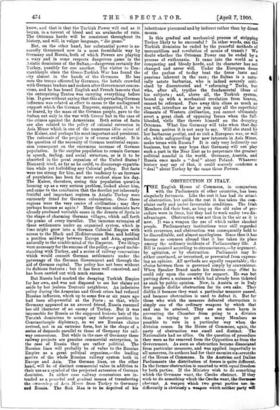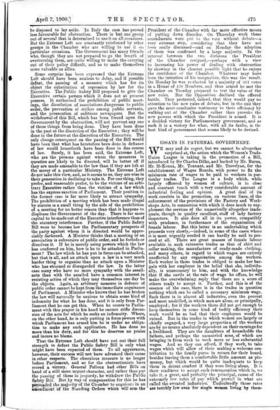OBSTRUCTION IN ITALY. T EE English House of Commons, in comparison
with the Parliaments of other countries, has been singularly fortunate. Like the rest it has had its attack of obstruction, but unlike the rest it has taken the com- plaint early and under favourable conditions. The Irish Members did their best, so long as the old rules of pro- cedure were in force, but they had to work under two dis- advantages. Obstruction was not then in the air as it is now. It was a weapon the use of which rather shocked people. Parliamentary institutions were still regarded with reverence, and obstruction was consequently held to be discreditable, and almost sacrilegious. Since then it has become so common abroad that it has taken its place among the ordinary incidents of Parliamentary life. A Bill is resisted according to circumstances,—by argument, by agitation, or by obstruction. Parliament may be either convinced, or terrorised, or prevented from express- ing an opinion. All methods are equally respectable ; the choice between them is governed simply by convenience. When Speaker Brand made his famous coup d'etat he could rely upon the country for support. He was but putting down a nuisance which had already been ticketed as such by public opinion. Now, in Austria or in Italy few people dislike obstruction for its own sake. They dislike it because they want a particular measure passed, and because obstruction is used to defeat it. But for those who wish the measure defeated obstruction is simply one of the ordinary weapons by which that end can be attained. They see no more harm in preventing the Chamber from going to a division than in trying to get as many Members as possible to vote in a particular way when the division comes. In the House of Commons, again, the party of obstruction was small and distinct. The Nationalists had no allies. On the .question of procedure they were as far removed from the Opposition as from the Government. As soon as obstruction became dissociated from particular measures, and was applied impartially to all measures, its authors had for their enemies six-sevenths of the House of Commons. In the Austrian and Italian Parliaments the distribution of forces is quite different. In the former obstruction is resorted to with equal freedom by both parties. If the Ministry wish to do something which the Germans want, the Czechs obstruct. If they wish to do something which the Czechs want, the Germans obstruct. A weapon which two great parties use in- differently is obviously a weapon which neither party will be disposed to lay aside. In Italy the case has proved less favourable for obstruction. There is but one group out of several that is determined to use it on all occasions. But the Extreme Left are constantly reinforced by other groups in the Chamber who are willing to use it on particular occasions. The Government has many friends who, though they are not prepared to go the length of overturning them, are quite willing to make the carrying out of their policy difficult, and so to make themselves more valuable as allies.
Some surprise has been expressed that the Extreme Left should have been anxious to delay, and if possible defeat, the passing of a measure which has for its object the substitution of repression by law for the Executive. The Public Safety Bill proposed to give the Executive certain powers which it does not at present possess. It authorised the prohibition of public meet- ings, the dissolution of associations dangerous to public order, the prevention of strikes among public servants, and the prosecution of seditious newspapers. But the withdrawal of this Bill, which has been forced upon the Government by the obstruction, will not prevent any one of these things from being done. They have been done in the past at the discretion of the Executive ; they will be done in the future at the discretion of the Executive. The only change consequent on the passing of the Bill would have been that what has heretofore been done in defiance of law would henceforth have been done in due course of law. Surely, it has been said, the Extreme Left, who are the persons against whom the measures in question are likely to be directed, will be better off if they are made amenable to the law than if they are left at the mercy of a particular Ministry. The Extreme Left do not take this view, and, as it seems to us. they are wise in their generation in declining to take it. For one thing, they prefer, and reasonably prefer, to be the victims of an arbi- trary Executive rather than the victims of a law which has the express sanction of Parliament. Their position in the former case is far more likely to attract sympathy. The prohibition of a meeting which has been made illegal by statute is a small thing by the side of the prohibition of a meeting for no better reason than that it happens to displease the Government of the day. There is far more capital to be made out of the Executive interference than of the statutory interference. Further, if the Public Safety Bill were to become law the Parliamentary prospects of the party against whom it is directed would be appre- ciably darkened. A Minister thinks that a meeting or an association is subversive of public order, and he forbids or dissolves it. If he is merely using powers which the law has conferred on him, how is he to be attacked in Parlia- ment? The law which he has put in force can be attacked, but that is all, and an attack upon a law is a very much harder thing to organise than an attack upon a Minister who has strained or disregarded the law. In the latter case many who have no more sympathy with the assail- ants than with the assailed have a common interest in resisting action of which they may themselves one day be the objects. Again, an arbitrary measure in defence of public order cannot be kept from the immediate cognisance of Parliament. A Minister who knows that he has broken the law will naturally be anxious to obtain some kind of indemnity for what he has done, and it is only from Par- liament that he can get this. When be comes to Parlia- ment with this prayer in his hand he cannot stifle discus. sion of the acts for which he seeks an indemnity. Where, on the other hand, he is only putting in force powers with which Parliament has armed him he is under no obliga- tion to make any such application. He has done no more than his duty, and for this he deserves no praise and incurs no blame.
That the Extreme Left should have put out their full strength to defeat the Public Safety Bill is only what might have been expected of them. To all appearance, however, their success will not have advanced their cause in other respects. The obnoxious measure is no longer before Parliament, and so far the obstructionists have scored a victory. General Pelloux had other Bills on hand of a still more urgent character, and rather than put the passing of these in jeopardy, he withdrew the Public Safety Bill. But by way of compensation for this be has persuaded the majority of the Chamber to acquiesce in an amendment of the Standing Orders which will arm the President of the Chamber with far more effective means of putting down disorder. On Thursday week 'these amendments wore put to the vote without debate—a very extreme step, considering that they have not been really discussed—and on Monday the adoption of them was confirmed by a large majority. In the interval between the two divisions the President of the Chamber resigned,—perhaps with a, view to increasing his power of dealing with obstruction by showing in the clearest possible light that he enjoys the confidence of the Chamber. Whatever may have been the intention of his resignation. this was the result. On Monday he was re-elected by a majority of eel votes in a House oft38 Members, and thus armed be met the Chamber on Tuesday prepared to test the value of the new rules. But the Opposition declined the offered battle. They protested, indeed, that they would pay no attention to the new rules of debate, but in the end they gave the most conclusive testimony to their efficiency by walking out of the Chamber rather than provoke the new powers with which the President is armed. It is a decided victory for Parliamentary government, and as such it is a victory for what, with all its faults, is the best kind of government that seems likely to be devised.







































 Previous page
Previous page